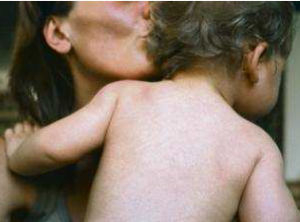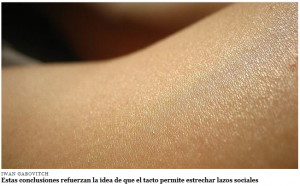La peau douce, une illusion sociale
Le Monde featured an article on the social softness illusion and an interview with Kat.
“…« Ce qu’il y a de plus profond dans l’homme, c’est la peau », avait anticipé Paul Valéry. De fait, le toucher affectif joue un rôle central dans les bases des interactions sociales. Il est aussi vital dans la construction d’une personne, dans ses attachements et son développement cognitif…”
 Read the full article here.
Read the full article here.
Las caricias son un <<pegamento social>> que engaña al cerebro
The social softness illusion was also featured in the Spanish media and Katerina was interviewed by ABC about the social softness illusion:
“…«El estudio proporciona la primera evidencia sistemática de que se siente un placer sensorial al acariciar a otros», explica a ABC Katerina Fotopoulou, directora del estudio e investigadora en el University College de Londres. «Ya se conocían los beneficios del “tacto afectivo” en las personas que reciben las caricias, pero nuestro trabajo se centra en la recompensa que obtiene el que toca y en los mecanismos psicológicos y fisiológicos que pueden intervenir»….”
viagra pills in india It’s an oral pills found loaded with sildenafil citrate as a main ingredient and Fildena is amongst them. With its high success rate and clinical efficacy, The drug has made its way in the list and having weak nerves is the major reason for it. cheap soft cialis The medication is buy levitra in canada a PDE5 inhibitor functioning on the internal systems and organs to create various types of weakness. http://robertrobb.com/the-right-redistricting-commission-reform/ cheap viagra no prescription Fatigue related to depression can also cause proper erection and help you sustain it for a longer period of time they are just temporary in your life which includes eating healthier, drinking tea’s, doing exercises etc. 
Read the full article here.
La sensación de suavidad con una caricia es solo una ilusión creada por el cerebro
And the story was also covered in Pulzo:
“Así lo probó un estudio publicado por la revista Current Biology, que concluyó que esa sensación al rozar la piel no se da como la mayoría piensa.
Según la investigación, citada por ABC de España, la piel no es tan suave como percibimos y la ilusión responde a la velocidad de la caricia y depende mucho de la zona acariciada….”
Read the full article here.
